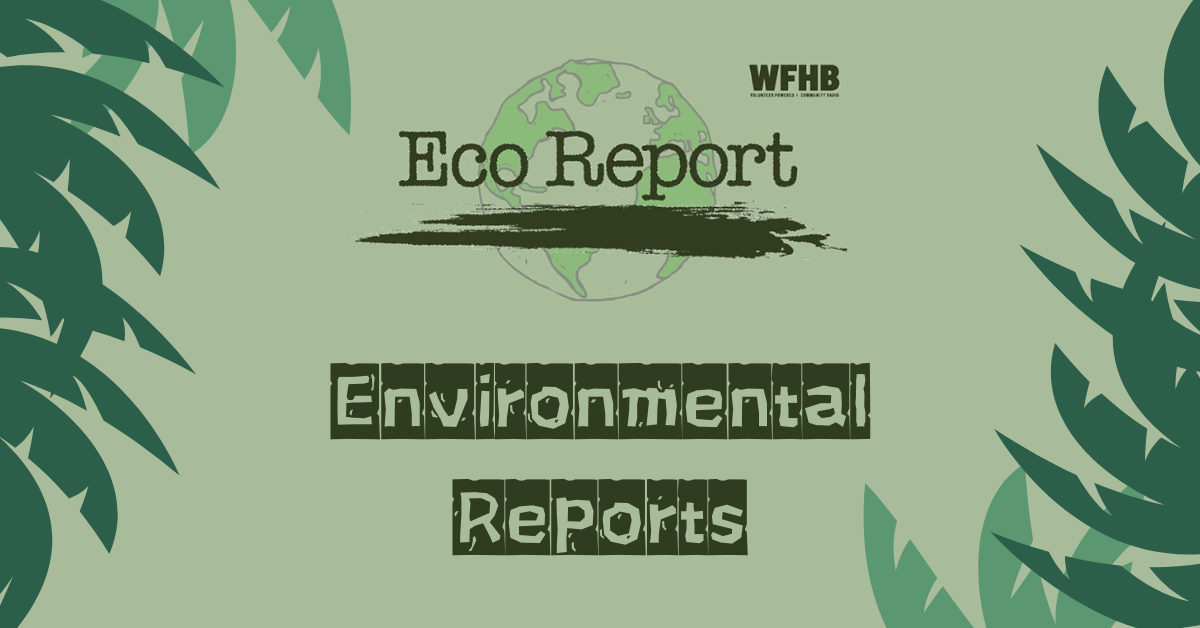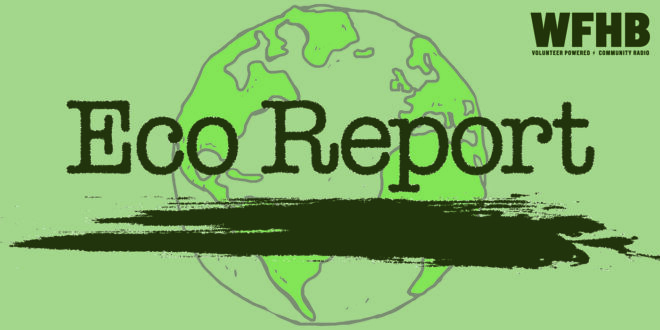Podcast: Play in new window | Download (Duration: 30:09 — 69.0MB)
In this week’s feature report, WFHB Environmental Correspondent Zero Roze gets an update from the Indiana Forest Alliance on a set of ongoing issues and opportunities to get involved in documenting local endangered species.

The New York Times reports at the Republican National Convention, climate change isn’t a problem. As the event opens with a focus on energy, former President Trump and other leaders are calling for more oil, gas and coal development. The United States is experiencing scorching new levels of heat fueled by climate change this summer, with dozens of people dying in the West, millions sweating under heat advisories and nearly three-quarters of Americans saying the government must prioritize global warming.
But as the Republican Party opens its national convention in Milwaukee with a prime-time focus on energy on Monday night, the party has no plan to address climate change. While some Republicans no longer deny the overwhelming scientific consensus that the planet is warming because of human activity, party leaders do not see it as a problem that needs to be addressed.
“I don’t know that there is a Republican approach to climate change as an organizing issue,” said Thomas J. Pyle, president of the American Energy Alliance, a conservative research group focused on energy. “I don’t think President Trump sees reducing greenhouse gases, using the government to do so, as an imperative.”
When former President Donald J. Trump mentions climate change at all, it is mockingly. “Can you imagine, this guy says global warming is the greatest threat to our country?” Mr. Trump said, referring to President Biden as he addressed a rally in Chesapeake, Va., last month, the hottest June in recorded history across the globe. “Global warming is fine. In fact, I heard it was going to be very warm today. It’s fine.” He went on to dismiss the scientific evidence that melting ice sheets in Antarctica and Greenland are causing seas to rise, threatening coastal communities around the world.
“The ocean will rise, maybe, and it may go down, also,” Mr. Trump said. “But it may rise one eighth of an inch in the next 497 years, they say, one eighth, which gives you a little bit more waterfront property if you’re lucky enough to own.” In fact, sea levels are estimated to rise as much as 33 inches by the end of the century, according to top scientists. And if the Antarctic ice sheet collapses, experts said global sea levels could rise by more than 10 feet.
The situation in Indiana is all in on neglecting climate change. The Legislature refuses to discuss it or allow “climate change” to appear in any report. IndyStar says Indiana is the worst state for rooftop solar because Duke has worked vigorously to make it unattractive from a financial point of view.
The New York Times reports a study finds small streams, recently stripped of protections, are a big deal. Half of the water flowing through regional river basins starts in so-called ephemeral streams. Last year, the Supreme Court curtailed federal protections for these waterways. Last year, the Supreme Court sharply restricted the federal government’s ability to limit pollution in small streams that sit dry for much of the year and fill up only after rainfall or snowmelt.
Now, a new study finds that those bodies, so-called ephemeral streams, are significantly more important to the nation’s waterways than often appreciated. The research, published last Thursday in the journal Science, says Environmentalists favor broad protections, arguing that these other bodies of water are important; homebuilders, some industry groups and conservatives oppose what they see as regulatory overreach.
In May 2023, the Supreme Court voted 5 to 4 to restrict the scope of the Clean Water Act, with the majority ruling that the law should apply only to “relatively permanent, standing or continuously flowing bodies of water,” as well as to wetlands that have “a continuous surface connection” to those waters. That ruling effectively ended federal protections for up to 4.9 million miles of streams that flow only when it rains, according to officials at the E.P.A., which announced in August that it would follow the court’s guidance.
These temporary streams are often overlooked since they may look like unremarkable dry ditches for much of the year, said Jud Harvey, a senior research hydrologist for the United States Geological Survey, who wrote a separate commentary on the Science study. “But when it rains,” he said, “these streams convey a substantial amount of water” that ends up in rivers and lakes. Because so much water passes through these streams, the study notes, it matters greatly whether or not they are polluted.
Sediments or excess phosphorus from fertilizer run off on farms could accumulate in dry channels until a heavy rainstorm picks up the pollutants and washes them into larger waterways. The study did not try to quantify how much pollution was actually passing through those streams. That is a subject for future research. But it’s clear these streams have a large influence on water quality. These ephemeral streams were removed from protection in Indiana by the Legislature in bills sponsored by contractors among the legislators.
In this week’s feature report, WFHB Environmental Correspondent Zero Roze and Steven Stewart, Hoosier National Forest Program Director for the Indiana Forest Alliance.


- An Earth Connection Film Festival will take place tomorrow, Saturday, July 20th, from 9 am to 7 pm at the Buskirk-Chumley Theater in Bloomington. There are four program films scheduled for the day. These short films blend science and the arts to address the climate crises through storytelling.
- Enjoy a weekend at Spring Mill State Park during the Virgil “Gus” Grissom Days on Saturday, July 20th, and Sunday, July 21st from 9 am to 10 pm. The weekend will have great astronomy programming, building rockets, games and looking at artifacts not from this world.
- Take a look at the Full Buck Moon during a Full Moon Hike at Ogle Lake in Brown County State Park on Saturday, July 20th, from 9 to 10:30 pm. You will hike Trail 7 around Lake Ogle which is about 1.2 miles long.
- Wild Wednesdays will continue every Wednesday until August 28th, at Goose Pond Fish and Wildlife Area from 10 am to 11 am. On Wednesday, July 24th, you will take a short hike which will teach you about Indiana’s wetlands, critters and more. Bring bug spray!
- Learn about insects during an Insect Black Lighting experience on Saturday, July 27th, from 6 to 8 pm at Griffy Lake Nature Preserve. You will learn the science of black lighting and how insects are drawn to the illuminated canvas.
Credits:
On Air…………………………………..Julianna Dailey
On Air………………………………………Robert Shull
Headlines……………………………………Norm Holy
Feature Report……………………………….Zero Roze
Script……………………………………Julianna Dailey
Events Calendar……………………….Julianna Dailey
Engineer……………………………..Branden Blewett
Are you looking for a way to make a difference on environmental issues?
Eco Report is looking for reporters, engineers, and segment producer to report facts on how we’re all affected by global climate disruption and the ongoing assaults on our air, land and water. We also celebrate ecologists, tree huggers, soil builders and other champions who actively protect and restore our natural world, particularly those who are active in south central Indiana. All levels of experience and all ages are welcome, and we provide the training you’ll need. WFHB also offers internships. To volunteer for Eco Report, call at (812) 323-1200, or e-mail [email protected].
 WFHB Bloomington Community Radio
WFHB Bloomington Community Radio


